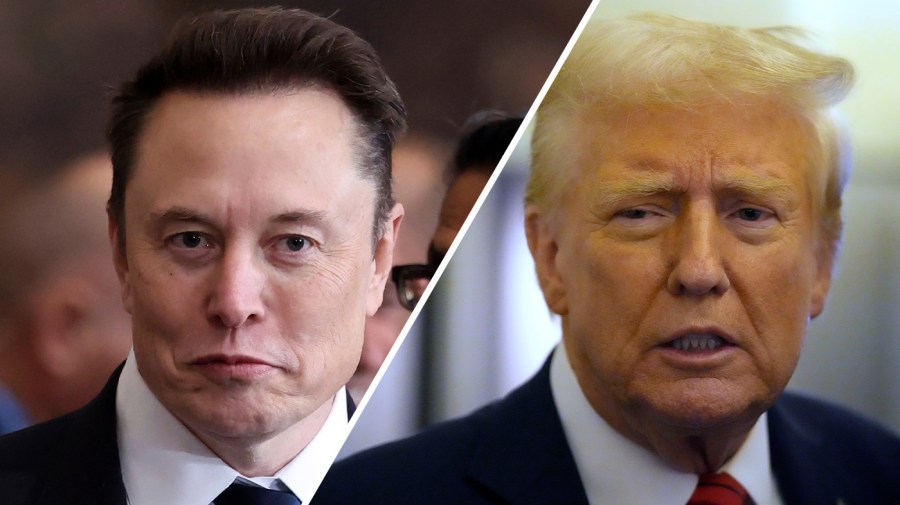
President Trump’s toppling of the U.S. Agency for International Development this week offered the public its clearest view yet of the chaotic four years to come. Trump’s strategy of dismantling USAID amid a flurry of executive orders is almost certainly an illegal exercise of powers reserved for Congress.
That doesn’t mean it won’t work.
Trump’s first two weeks in office have been an unparalleled attack on the separation of executive and legislative power. Not only has Trump falsely claimed the power to “freeze” spending already appropriated by Congress — effectively a line item veto on steroids — his closure of USAID is a direct attack on congressional authority. Even so, good luck finding a single Capitol Hill Republican willing to defend Congress’s equal status in this governing partnership.
Trump’s latest threat, to shutter the Department of Education, is written in the language of a president convinced he stands above the constitutional order. Our congressional leaders must send a message to the White House by fiercely defending their legal authority to decide the future of USAID. As history has too often shown, powers seized by the White House are almost never given back to their original owners.
Even in a political culture where truth evaporates at room temperature, the law is clear. Despite starting its life by executive order under President John F. Kennedy in 1961, Congress codified USAID as an official independent agency in the 1998 Foreign Affairs Reform and Restructuring Act. Republicans may think USAID is one big liberal slush fund, but it’s clearly up to Congress — not the White House — to determine the scope of the agency.
The specific threat posed by Trump’s power grab is one our Founders knew well. The issue was clearly on their mind during the drafting of the Constitution in 1787, having just fought a bloody war to free themselves from an overbearing executive. In fact, concerns about a president seizing legislative powers — especially the power of the purse — dominated the media discourse of the day. How little has changed.
The scenes outside USAID headquarters this week may have lacked the drama of the Boston Massacre, but what was going on inside was equally revolutionary. It was there that Trump ally and megadonor Elon Musk directed officials to be locked out of their offices and refused entry to the building. “Spent the weekend feeding USAID into the wood chipper,” Musk would later gloat on X.
Nobody in Republican circles seemed concerned that Musk, who faces no form of congressional oversight, had been given unrestricted access to the Treasury Department’s sensitive payment system as a means to further choke off USAID funds. Nor did a single Republican lawmaker speak up when Musk voiced the extreme legal theory that Trump could dissolve any agency or department he wanted without consulting Congress.
The framers of our Constitution wisely agreed that if the president had a problem with a law passed by Congress, he could persuade and cajole them to reform or repeal the law. It was, crucially, a transparent process meant to play out in full view of the public. Our founders both anticipated and explicitly took steps to prevent the type of unilateral action Trump just unleashed on USAID. Their only failing was expecting Congress to jealously guard its power instead of willingly surrendering it to the president.
As is so common in Trumpian schemes, the end result is legal and organizational chaos. Secretary of State Marco Rubio on Monday declared himself acting director of USAID and announced a plan for the State Department to absorb whatever parts of USAID Musk doesn’t evaporate entirely. That must come with some bitterness for Rubio, who was once one of the Senate’s leading USAID expansionists.
Perhaps the Senate’s weak-willed Republicans think the federal courts will bail them out by ordering injunctions on Trump’s orders. That would certainly spare lawmakers the unpleasantness of disagreeing with Trump in public. But the Supreme Court’s recent rulings broadly expanding executive power aren’t reassuring. The courts simply can’t be counted on to uphold the constitutional balance of power. Congress will need to do this heavy lifting itself.
Trump’s indefensible power grab at USAID, and his similar plans for the Department of Education, should give all lawmakers cause to reflect on their oath of office and what it means to serve our Constitution and our country. More than ever before, the American people need and deserve a strong Congress to check and balance Trump’s increasingly authoritarian White House.
Max Burns is a veteran Democratic strategist and founder of Third Degree Strategies.








